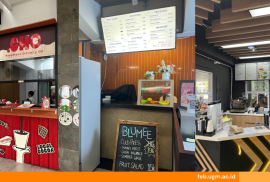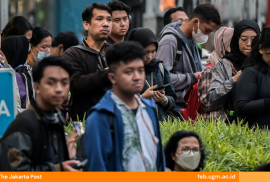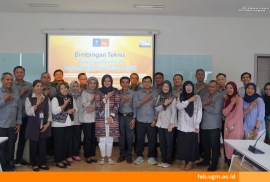In collaboration with the ANU Indonesia Project, the Faculty of Economics and Business, Universitas Gadjah Mada (FEB UGM) is holding an annual public policy forum series titled Mubyarto Public Policy Forum with the theme “Is ignorance bliss? An experimental approach to estimating unregulated corruption” on Friday (4/11). This forum took place as a form of respect for Professor Mubyarto, a prominent economist at UGM, who was also one of the most influential Indonesian intellectuals on rural development issues in the 1960s and 1990s.
This year’s Mubyarto Public Policy Forum invited Rimawan Pradiptyo, S.E., M.Sc., Ph.D. (Faculty of Economics and Business, Universitas Gadjah Mada), Dr. Arianto Patunru (Indonesia Project, The Australian National University), Dr. Vivi Alatas (CEO of Asakreativita) as the speaker. This forum was moderated by Novat Pugo Sambodo, S.E., MIDEC. This forum is divided into three parts, namely a presentation by Dr. Rimawan, discussion with Prof Arianto and Dr. Vivi, and a questions and answers session with the audience.
Rimawan discussed his research on unregulated corruption. He started the presentation by explaining alternative methods and methods for measuring corruption, including court decisions, victimization, and index. Rimawan continued with a comparative study of Anti-Corruption Policies and Institutions in Indonesia and Malaysia: in Indonesia it was initiated by the establishment of the Corruption Eradication Commission (KPK), while in Malaysia it was initiated by the United Nations Convention Against Corruption (UNCAC). Rimawan also presented recommendations for handling several types of corruption from UNCAC which have not been implemented in Indonesia, including private sector corruption, illegal increase in wealth, foreign bribery, and influence trading. Then he presented an analysis of the impact of punishment on behavior (Gneezy & Rustichini, 2000). This analysis proves that more severe penalties can discourage acts of corruption. Rimawan then illustrated his presentation by presenting the schemes of The Public-Goods Embezzlement (PGE) Game, The Public-Goods Bribery Game (PGB), Control vs Treatment Groups. Rimawan continued his explanation by explaining the subject, sequence, and variables of his research. Then, he presented the results of his research by presenting graphs of data from his research which included the intensity of corruption, impact to incidence and impact to intensity, as well as reluctance to disclose and revolutionary processes. Rimawan ended his presentation by presenting the future research agenda.
The webinar was continued by Arianto with comments related to research conducted by Rimawan. Arianto summarized Rimawan’s presentation, then explained the economic narrative in analyzing corruption. Arianto also addresses the question “Is corruption a principal-agent problem” by illustrating and discussing the table by McLeod (forthcoming). Arianto continued by discussing definitions and views on corruption from various perspectives, including research by Rimawan et al, and Laksamana (ret.) Sudomo. Going deeper, Arianto also explained the corruption typology table according to the class of corruptors and the involvement of thieves or exchanging assets. Arianto ended his discussion by presenting a separate corruption index and mentioning the references he used. The discussion continued with a discussion of the same research note by Vivi Alatas. Vivi elaborates on the main research findings by Rimawan et al, and discusses further elaboration regarding other findings in the research. Vivi then presented a case study based on an economic approach formula. The case study proves that if a corruptor wants to maximize profits, he will take all public goods if there are no sanctions. She then explained several case studies with different corruptor motivations, using the same economic formula. Vivi then explained the findings that there were several question marks in the research and insights that could be studied further.
The Mubyarto Public Policy Forum continued with comments and clarifications by Rimawan on the discussion presented by Arianto and Vivi. Arianto and Vivi also commented on each other’s insights and research results. The moderator then invites the audience to ask questions. The discussion went on interestingly, insightfully, and responsively. The Mubyarto Public Policy Forum was closed after Pugo as the moderator delivered the closing and summary of the discussion.
Reportage: Hayfaza Nayottama




